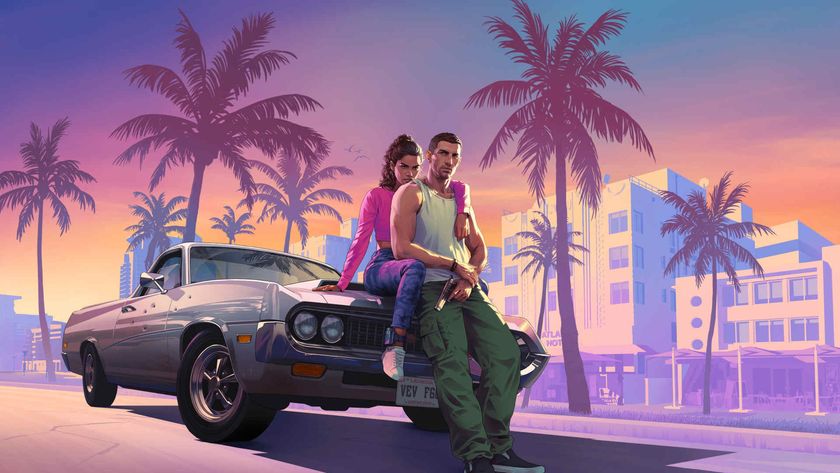Why you can trust GamesRadar+
The man is either a genius whose insatiable appetite for perfection drives him relentlessly onwards, or a megalomaniacal egoist whose unswerving, singular vision is obsolete in the modern age...
But enough about Martin Scorsese. Howard Hughes, meanwhile, packed enough drama into his 70 years for several lifetimes, leaving abundant biographical material for any director to sink his teeth into. Scorsese has bitten down hard. If there's one thing he understands, it's obsession; witness the epic, 20-odd-year battle to make Gangs Of New York or the self-sabotaging manias of his on-screen alter-ego De Niro in New York, New York and The King Of Comedy. And, boy, was Hughes obsessed - even if Scorsese can only explore this rather than explain it...
Sensibly, he telescopes the story, focusing from the late '20s to early '40s, the years in which Hughes went from filmmaker to flyer to mentally disturbed hermit, via periods as a playboy, CIA assistant and push-up bra designer (""It's all just engineering"," he explains).
A frankly creepy opening depicts the seven-year-old Sonny (as he was then known) being scrubbed down in a tin bath by his glamorous mother, who instils in him an obsession (that word again) with cleanliness and germs that would remain until death.
Surprisingly, this is The Aviator's only reference to Hughes' formative years. Within minutes, we're amid the madness on the set of Hell's Angels, his extravagant directorial debut. The story of two RAF fighter pilots trying to woo the same woman during World War One, Angels allowed him to indulge his love of flying and filmmaking and cost a bomb; the $4-million production taking three years to complete. It's during these scenes we first glimpse the imposing character Hughes quickly became and learn to share his thrill at flying (the aerial sequences are superbthroughout).
We also see if DiCaprio can cut it. Overshadowed by Daniel Day-Lewis' grandstanding turn in Gangs, the young star has a point to prove. He makes it with élan. Ambitious, arrogant, youthful, rich, sexy, powerful... Hey, you could say it's hardly a stretch, but despite initial reservations about the amount of gravitas he can bring to the role (he looks about 12 years old in his opening scenes), DiCaprio ably conveys a whirlwind of energy and charisma, completely convincing as a man who pushed, pulled and bullied boundaries to always get his own way. From the get-go, you're caught up in DiCaprio/Hughes' unique dynamism and despite a near three-hour running time, you'll still be gripped come the closing credits. Whether or not Leo's post-Titanic fanbase will be able to connect with his creation is debateable, but the Academy should be interested.
Will the film itself snare Scorsese his long longed-for gong? After Gangs' 10 noms/no wins whitewash, all bets are off, but this is the sort of prestige-picture Oscar voters traditionally love. It would also be true to tradition if he were to win for a movie which is by no means his best work; think Al Pacino for Scent Of A Woman or Robert Redford for Ordinary People. The Aviator is superior to either of those movies, but it does reflect the director's admission that the bigger the budget, the more conservative you must be. The gore of Gangs was widely thought to have harmed his Best Director chances and he takes no equivalent risks here; Hughes' bisexuality, for example, is ignored.
Still, there's verve, style and exceptional camerawork that is pure Scorsese and he's attracted an extraordinary cast, from the ever-excellent John C Reilly (as Hughes' right-hand man) to the ubiquitous Jude Law, who cameos as Errol Flynn. The stunning Kate Beckinsale is somewhat underused (and over made-up) as Ava Gardner, but Cate Blanchett is brilliant as another of Hughes' movie-star lovers, Katharine Hepburn, oozing an imperious air of Hollywood royalty (anyone else up for Best Supporting Actress might as well skip the ceremony). And there are meaty villainous turns from Alec Baldwin, as Howard's nemesis Juan Trippe (owner of rival airline Pan Am), and Alan Alda, as corrupt, Hughes-hating senator Ralph Owen Brewster.
The biggest disappointment is how little light the film sheds on what drove its subject. Although it does touch on the roots of his various compulsions, there's no answer as to why he was so motivated to explore the sky. But while there may be no Rosebud for this Citizen Plane, The Aviator still takes you on a thrilling ride.
Not the masterpiece we yearned for, but Scorsese's Oscar hopeful is sumptuously mounted and DiCaprio magnetic. Book your flight.
The Total Film team are made up of the finest minds in all of film journalism. They are: Editor Jane Crowther, Deputy Editor Matt Maytum, Reviews Ed Matthew Leyland, News Editor Jordan Farley, and Online Editor Emily Murray. Expect exclusive news, reviews, features, and more from the team behind the smarter movie magazine.

Ahead of GTA 6, Take-Two CEO says he’s “not worried about AI creating hits” because it’s built on recycled data: “Big hits […] need to be created out of thin air”

Getting Over It creator Bennett Foddy threatens the world once again: If you want Baby Steps to be a brutal rage game, "you can inflict that on yourself"

A Simpsons Hit and Run Remake will probably never happen – and I don't want it to










